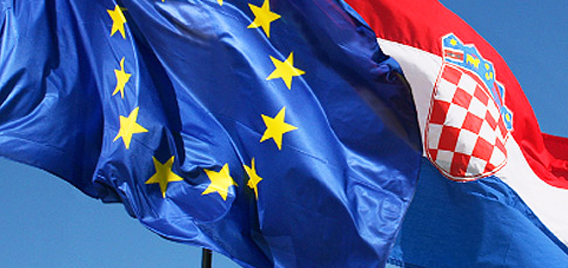European standards, one of the bigger challenges for BiH’s economy after Croatia’s accession to the EU, are in fact the road which, for BiH, would open a market much larger than the Croatian one alone. Bosnia and Herzegovina will, as of 1 July 2013, literally be at the door of the European Union – a market of half a billion people.
It will be up to Croatia whether to seek the agreement of the other EU member states for allowing BiH citizens to enter with ID cards. Should this not happen, BiH citizens travelling to neighbouring Croatia for this year’s summer vacation will have to carry their passports.
Due to gaps in legislation, some unclarity of competences and the need for harmonisation between the state level and entities in the BiH food and feed control system, milk, dairy products, eggs and poultry from BiH will not be able to cross the Croatian border as of 1 July. In the case of potatoes, BiH will have to prove over a three year period that this product does not contain substances harmful to human health. Plants that are not subject to special conditions, such as lettuce, peppers, tomatoes and several kinds of fruit, will be able to be marketed in the EU, as long as the size, structure, appearance and fragrance of the products satisfies border controls.
Clearly producers need the support of BiH institutions so that any negative impacts are only present for as short a time as possible. BiH needs to harmonize its legislation with European legislation – from systematic laws up to regulations and ordinances for the control of all kinds of products. In practice, this means controlling the process of food production “from farm to table”.
Changes to legislation in BiH are necessary, amongst others, to establish a system that would allow authorities to quickly and reliably find out for example in the case of a virus being found, where exactly in the chain of the agri-food production deficiencies have occurred. This is to protect the health of the consumers in both the EU and in Bosnia and Herzegovina. Such a system has been established in all EU Member States and it is required with regard to imports of such goods into the EU. This illustrates how Croatia’s accession will be an opportunity to accelerate reforms and new quality standards in sectors like food production and processing.
At the December 2012 meeting between BiH, Croatia and European Commission, the Commission took note of progress made in the alignment of the legislation in the food-safety, veterinary and phytosanitary area, but encouraged the authorities of Bosnia and Herzegovina to finalise their work.
To achieve concrete progress in the Food and Veterinary sector, the Law on Food and the Veterinary Law now have to be revised. A working group for the revision of the Law on Veterinary and Food Safety has been established and plans to finalise new drafts in the next few months.
The completion of this work has to be also followed by an implementation process on the entity level, since the primary responsibility to carry out controls is with the entities. The implementation process includes the adaption of entity legislation to the State-level Laws and the Hygiene Package as well as education and training of the competent authorities.
Discussions between BiH, Croatia and the EU on two key border management issues are under way. Passage to and from the port of Ploce for cargo coming from BiH) and transit of traffic (coming from and going to Croatian territory) through Neum is still the subject of negotiations because the existing Agreement on transit through the port of Ploce is not in line with the Acquis Communautaire. Passage through Ploce is especially important because this is a route for the not yet compatible with EU standards exports of BiH’s products of animal origin toward countries that are not in the European Union.
It is currently foreseen that there will be two Border Inspection Points (BIPs) between BiH and Croatia at Nova Gradiska – Gradiska and Nova Sela – Bijaca. For the moment, these will be the only border crossings that animal origin products will go through on their way to the EU.
The European Union has invested 19 million EUR in support of establishing procedures and logistics to control the safety and quality of food in Bosnia and Herzegovina in the last ten years. The EU will continue to assist Bosnia and Herzegovina in this and in all other processes necessary to adapt to the European standards, but most of the work depends on Bosnia and Herzegovina.




